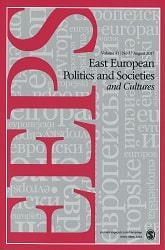The Structure of Political Attitudes in Hungary and Serbia
The Structure of Political Attitudes in Hungary and Serbia
Author(s): Bojan TodosijevićSubject(s): Civil Society, Political history, Crowd Psychology: Mass phenomena and political interactions, Nationalism Studies, Transformation Period (1990 - 2010), Post-Communist Transformation, Sociology of Politics
Published by: SAGE Publications Ltd
Keywords: ideology; Hungary; political attitudes; Serbia; structure of attitudes;
Summary/Abstract: The article presents a comparative examination of the structure of political ideology in two post-communist countries, Serbia and Hungary. A broad set of indicators of specific political attitudes is reduced to a smaller number of latent ideological dimensions via factor analysis. The precise meaning of the dimensions is determined after the analysis of their relationships with authoritarianism, out-group sympathy, prejudices, ideological self-identification, party-preference, and socio-demographic variables. Hungarian mass attitudes vary along dimensions of (1) alienation–socialism and (2) nationalist–antisocialism. Results for Serbia revealed the convergence of nationalist and pro-communist attitudes into a single dimension while another factor joined egalitarianism with social alienation. In both countries, authoritarianism is an important determinant of ideological dimensions, especially of pro-communist nationalism in Serbia and alienation– socialism in Hungary. Socio-demographic background variables are weaker determinants of ideological dimensions in Serbia compared with Hungary. In both countries, attitudinal factors differentiate supporters of the main political parties.
Journal: East European Politics and Societies
- Issue Year: 22/2008
- Issue No: 04
- Page Range: 879-900
- Page Count: 22
- Language: English
- Content File-PDF

